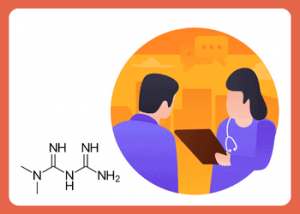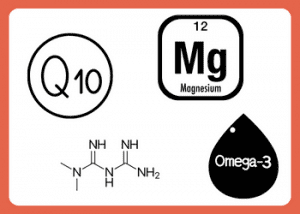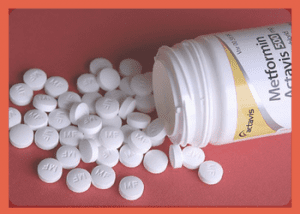As we strive to remain healthy and prolong our lifespan, it’s essential that we examine the medications used to sustain our health. Metformin is one such medicine prescribed for type II diabetes but recent studies suggest more benefits beyond its original purpose.
With proper use of this medication, not only can people manage their sugar levels better, they may even gain additional advantages in the long run.
Before adding metformin to your health and wellness routine, it’s essential that you know the advantages as well as any potential side effects of this medication.
With our comprehensive guide, we’ll explore all aspects of metformin – from its benefits to its drawbacks and everything in between – so you can make an informed decision on if it is suitable for your needs.
Table of Contents
What is Metformin?
Metformin is a widely used drug to control and manage type 2 diabetes. Here are some key scientific facts:
- Metformin is a part of the biguanide family of medications.
- This remarkable process works by minimizing glucose production in the liver and gradually improving sensitivity to insulin within the body’s cells.
 Unlike other diabetes medications, it does not stimulate the production of insulin.
Unlike other diabetes medications, it does not stimulate the production of insulin.- This drug is usually administered in the form of a pill that is taken orally.
- Metformin is quickly absorbed in the small intestine, reaching its peak concentration in the blood approximately two hours following ingestion.
- As the kidneys are responsible for eliminating this medication from the body, dosage levels may need to be altered if one has impaired kidney function.
- In addition to its proven utility in diabetes management, it may also offer a number of other health benefits including lowering the odds of developing certain cancers and heart disease.
- Boasting a safe and effective history of over 60 years, the medication has become an indisputable treatment option for many individuals struggling with type 2 diabetes.
Metformin is a cornerstone of type 2 diabetes management, having proven its safety and efficacy over many years. Whether it’s the right treatment option for you personally will depend on your individual health profile; so always chat with your doctor or medical team before taking any steps forward.
Benefits of Metformin
It’s essential to bear in mind that the advantages of taking metformin may differ depending on specific factors, such as age, health condition, and other medicines being taken.
- Reduces blood glucose levels: Metformin works to benefit people living with diabetes by reducing glucose production in the liver and bolstering insulin sensitivity throughout your body, resulting in lower blood sugar levels.
- Promotes weight loss: According to certain studies, metformin has been suggested as a helpful aid for those with type 2 diabetes in terms of weight loss. It’s believed that it does so by suppressing the appetite and increasing energy expenditure. Any natural alternative to metformin for weight loss? There is currently no natural alternative.
- Reduces cardiovascular risk: Metformin has the potential to reduce cardiovascular-disease risks in people with diabetes, possibly by reducing inflammation and enhancing lipid levels. With this medication, those suffering from diabetes may be able to protect themselves against heart disease.
- Lowers cancer risk: Growing evidence suggests that metformin could play a role in diminishing the likelihood of numerous cancers, including breast, colon, and pancreatic cancer.
- Improves reproductive health: Metformin is proving to be an invaluable tool in treating reproductive health issues such as polycystic ovary syndrome (PCOS) and infertility. Its ability to regulate hormones and other bodily functions helps those suffering from these conditions gain control of their lives again.
- Anti-aging effects: Recent studies have suggested that metformin may possess anti-aging properties, potentially by amplifying mitochondrial performance and reducing inflammation levels.
To boot, certain side effects and interactions with different medications should be considered prior to start or changing any medication regimen; therefore it is imperative to discuss potential risks and benefits thoroughly with a healthcare provider before proceeding.
Side Effects and Precautions. What is the Downside of Taking Metformin?
Metformin is generally recognized as a safe and efficient drug; however, like any other medication, it does have certain side effects to be wary of before taking it. Therefore, precautionary measures should always be taken into account beforehand when using metformin.
Here are some of the most common side effects and precautions:
Side Effects:
- Gastrointestinal issues: For a few individuals, it can cause nausea, stomach upset, and diarrhea.
- Vitamin B12 deficiency: If taken long-term, metformin can obstruct the absorption of Vitamin B12 which then may cause anemia and neuropathy, along with other potential medical problems.
- Lactic acidosis: It is a powerful drug, yet in some cases, it can cause an accumulation of lactic acid in the body. If left unaddressed, this potential complication could be quite dangerous – even life-threatening.
 Precautions:
Precautions:
- Kidney function: Metformin is mainly excreted by the kidneys, so individuals with impaired kidney function are likely to experience more adverse effects.
- Liver function: Metformin may lead to liver function issues in certain individuals, especially those with existing hepatic conditions.
- Drug interactions: Be mindful of potential interactions when taking Metformin, as it may interact with diuretics, steroids, and antipsychotics.
- Alcohol use: Combining metformin with alcohol consumption can significantly increase your chances of developing lactic acidosis.
Metformin is considered a safe and efficacious medication for most people with type 2 diabetes, however, it’s critical to be conscious of its potential side effects.
To ensure proper and effective use, those taking this supplement should collaborate closely with their healthcare provider in order to monitor any related issues while adjusting treatment when necessary.
What Foods Have Natural Metformin
Metformin is a manufactured drug and is not available in any type of food. However, certain foods can help improve blood sugar regulation and insulin sensitivity – conditions that metformin also treats. Here are some examples:
- Berries: Packed with antioxidants, blueberries, strawberries, and raspberries are not only deliciously mouth-watering but may have a positive effect on insulin sensitivity.
- Leafy greens: An abundance of fiber is present in spinach, kale, and other leafy greens which could be beneficial for regulating your blood sugar levels.
- Nuts: Almonds, walnuts, and other nuts are a nutritious source of protein and healthy fats that can help attenuate the assimilation of carbohydrates while curbing spikes in blood sugar.
- Whole grains: Whole grains such as brown rice, quinoa, and whole wheat bread are chock-full of fiber and can help improve your body’s sensitivity to insulin.
- Cinnamon: Studies have demonstrated that cinnamon may be advantageous to blood sugar control, although more research is needed for a definitive determination.
Although these foods can provide a valuable contribution to one’s healthy diet when it comes to regulating blood sugar levels, they should not be used as an alternative to the medication prescribed by your doctor or healthcare provider.
Is There a Good Substitute for Metformin
While metformin cannot be replaced by a universal option, there are various alternative medications that may effectively treat type 2 diabetes depending on your personal medical details and lifestyle.
Before determining the best approach for you, healthcare professionals should consider all relevant factors such as your health profile, current medication use, and way of life. Some of these medications include:
- Sulfonylureas: These medications stimulate the pancreas to produce more insulin, which can help lower blood sugar levels.
- DPP-4 inhibitors: These medications help increase insulin production and decrease glucose production by the liver.
- GLP-1 receptor agonists: These medications stimulate insulin production and slow the absorption of glucose in the intestines.
- SGLT2 inhibitors: These medications work by reducing glucose reabsorption in the kidneys, leading to increased glucose excretion and lower blood sugar levels.
Metformin and other medications used to treat high blood sugar can have side effects, so it’s essential to speak with a healthcare provider before taking them.
Additionally, creating healthy changes in lifestyle such as exercising regularly, eating nutritious foods, and losing weight may be beneficial for some individuals in managing their levels of glucose.
Berberine vs Metformin
Berberine and metformin are two commonly used medications for managing diabetes. While metformin is a prescription medication, berberine is a natural compound derived from plants such as barberry and goldenseal.
Here’s a comparison table of the two:
| Berberine | Metformin | |
|---|---|---|
| Source | Plant-derived | Synthetic |
| Mechanism of action | Reduces glucose production, improves insulin sensitivity | Reduces glucose production, improves insulin sensitivity |
| Effectiveness | Similar to metformin in reducing blood sugar levels | More established in reducing blood sugar levels |
| Side effects | Gastrointestinal upset, potential drug interactions | Gastrointestinal upset, potential drug interactions |
| Dosage | Typically 500mg-1500mg per day, divided into 2-3 doses | Starting dose of 500mg-850mg per day, increasing up to a maximum of 2000mg per day, divided into 2-3 doses |
While both berberine and metformin can be effective in managing blood sugar levels, metformin is generally more established and is the first-line medication prescribed for people with type 2 diabetes.
Berberine is considered a natural alternative, but it may not be as effective for everyone and may have gastrointestinal side effects and potential interactions with other medications.
Uses of Metformin. Supplements to Take with
Taking metformin can be successful in treating diabetes, however, it may deplete the body of essential vitamins, such as B12 and folate.
To combat this, doctors suggest supplementing with these nutrients to avoid deficiency. Plus, since metformin has been known to cause GI-related issues for some people; a probiotic supplement might help support digestive health as well.
Other supplements that may be beneficial for people taking metformin include:
- Coenzyme Q10: This antioxidant may help improve mitochondrial function and reduce inflammation.
- Magnesium: Some studies suggest that magnesium supplementation can improve insulin sensitivity in people with type 2 diabetes.
- Omega-3 fatty acids: These healthy fats have been shown to reduce inflammation and improve lipid levels in people with diabetes.
- Vitamin D: Low levels of vitamin D have been linked to an increased risk of diabetes and poor glucose control.
When beginning any dietary supplement program, it is vital to speak with your physician first so that they can consider how the supplements may interact potentially with other medications or medical conditions.
Besides being mindful of potential interactions, you should make sure to select premium quality products from trustworthy resources and adhere strictly to all recommended dosage directions.

The dosage of metformin varies depending on the individual’s needs and medical history. Typically, the starting dose is 500mg or 850mg taken once daily with food, and the dosage can be gradually increased up to a maximum of 2000mg per day in divided doses.
However, the dosage may need to be adjusted for people with certain conditions such as kidney impairment or liver disease. It’s important to follow the dosage instructions provided by your healthcare provider and to never take more or less than prescribed.
It’s also important to note that metformin should not be taken by people with certain conditions, such as severe kidney or liver disease, heart failure, or alcohol abuse. Additionally, it may interact with other medications, so it’s important to inform your healthcare provider of all the medications you are taking before starting metformin.
Overall, the dosage of metformin should be tailored to the individual’s needs and medical history to ensure safety and effectiveness. Your healthcare provider can help determine the appropriate dosage for you.
Frequently Asked Questions
What is the Best to Take Metformin?
For the best results, take your metformin tablets with or directly following dinner. Ensure to swallow them whole and avoid chewing. Drink plenty of water when taking these tablets in order to reduce any potential side effects.
What Can I Take Naturally Instead of Metformin?
While it may be tempting to seek natural remedies for type 2 diabetes, none have yet been found as reliable or effective in controlling blood sugar levels as much as metformin.
Is There an Alternative to Metformin Tablets?
While metformin is commonly prescribed to those with type 2 diabetes, it isn’t the perfect fit for all patients. An alternative medication known as salicylate works similarly and may be a better option for some individuals.
What are the Different Brands of Metformin?
- Fortamet.
- Glucophage.
- Glucophage XR.
- Glumetza.
- Riomet.
- Riomet ER.
Is There a Better Drug for Type 2 Diabetes than Metformin?
There are other medications available to treat type 2 diabetes if metformin is not adequately managing your blood sugar levels or causing unwanted side effects. However, the choice of medication will depend on your individual circumstances and medical history.
What A1C Level Requires Metformin?
Metformin is a widely prescribed medication for managing type 2 diabetes mellitus (T2DM). It is particularly effective in lowering blood glucose levels and improving insulin sensitivity. The A1C test, which measures the average blood glucose levels over the past 2-3 months, is a crucial tool for diagnosing and monitoring diabetes. Understanding the A1C levels at which metformin is recommended can help in early intervention and better management of the condition.
A1C and Diabetes Diagnosis
The A1C test is reported as a percentage, indicating the proportion of glycated hemoglobin in the blood. The American Diabetes Association (ADA) classifies A1C levels as follows:
Normal: Below 5.7%
Prediabetes: 5.7% to 6.4%
Diabetes: 6.5% or higher
When is Metformin Recommended?
Metformin is typically considered for patients diagnosed with T2DM, especially when lifestyle modifications such as diet and exercise alone are insufficient to achieve glycemic control. According to the ADA and other clinical guidelines, metformin is recommended for individuals with an A1C level of 6.5% or higher, indicating the presence of diabetes.
A1C 6.5% to 7.5%: For newly diagnosed individuals with an A1C in this range, lifestyle interventions are the first line of treatment. However, if there is inadequate glycemic control after three months of lifestyle changes, metformin is usually initiated. The rationale is that early intervention with metformin can help prevent disease progression and reduce the risk of diabetes-related complications.
A1C above 7.5%: For individuals with an A1C level above 7.5%, metformin is often started alongside lifestyle modifications from the outset. Higher A1C levels suggest more significant hyperglycemia that may not be adequately controlled by lifestyle changes alone.
A1C above 9%: In cases where the A1C level is above 9%, particularly if the patient is symptomatic, dual therapy with metformin and another antihyperglycemic agent might be necessary. In some cases, insulin therapy may be considered to rapidly control blood glucose levels.
Benefits of Early Metformin Use
Starting metformin early in the course of T2DM offers several benefits:
Improved Glycemic Control: Metformin effectively lowers blood glucose levels by reducing hepatic glucose production and enhancing insulin sensitivity.
Weight Management: Unlike some other antidiabetic medications, metformin is associated with weight neutrality or modest weight loss.
Cardiovascular Protection: Metformin has been shown to reduce the risk of cardiovascular events in patients with T2DM.
Metformin is a cornerstone in the management of T2DM, particularly for individuals with an A1C level of 6.5% or higher. Its early initiation, alongside lifestyle modifications, can significantly improve glycemic control and reduce the risk of long-term complications. Regular monitoring of A1C levels is essential to tailor treatment strategies and ensure optimal diabetes management.
Conclusion
To summarize, metformin is a well-known treatment for type 2 diabetes and can help keep blood sugar levels in check. It affects the body by reducing glucose production from the liver and increasing insulin sensitivity, among other methods.
Furthermore, beyond its primary purpose of managing diabetes, there are studies that suggest it may also be beneficial for weight loss or cancer prevention.
Nevertheless, like any medication, it can have potential adverse reactions and must be used cautiously, particularly in people with particular medical issues or who are already taking other drugs. It’s essential to consult a healthcare provider to make the best choice when dealing with individual needs and circumstances.

 Unlike other diabetes medications, it does not stimulate the production of insulin.
Unlike other diabetes medications, it does not stimulate the production of insulin.